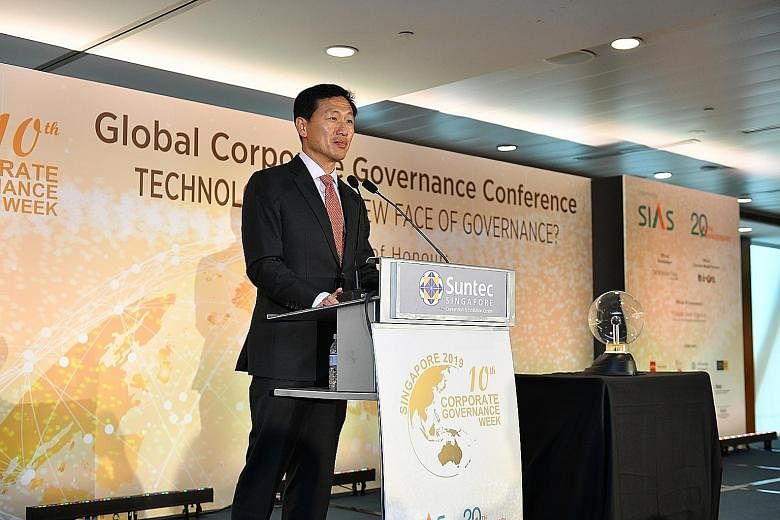Rules and regulations on corporate governance need to cater to technological advances and be risk-focused, said Education Minister Ong Ye Kung yesterday.
They should also take into account the stage of development of the industry as that affects the extent to which they are general or prescriptive, said the minister, who is a board member of the Monetary Authority of Singapore (MAS).
While not synonymous with corporate governance, rules and regulations are a key mechanism for achieving better outcomes, such as protecting the interests of minority shareholders, encouraging innovation and seizing opportunities, he said.
The central question is how to bring about rules that are good for the long term, he said.
"How we enact and enforce rules and regulations become an exercise of artistry, not just to tackle problems here and now, but to nurture a stronger and better culture for corporate governance.
"Hence, rule makers and enforcers, like companies, also need to take a long-term view," Mr Ong said at the start of the 10th annual Corporate Governance Week, organised by the Securities Investors Association Singapore (Sias).
The series of conferences, forums and workshops on the theme of leveraging technology for corporate governance runs until Oct 1.
Mr Ong cited three considerations when enacting rules.
First, they need to be technologically neutral so that they take into account tech advances that disrupt industry and market activities, he said.
To drive home his point, he referenced the Securities and Futures Act, which regulates securities and derivatives activities not only at bricks-and-mortar facilities, but also on fully electronic platforms.
Second, rules need to be differentiated according to the risks posed by activities or entities.
Third, the approach to rule-setting and review must fit the times.
He noted there are typically two approaches to making rules.
One is to make them more detailed, specific and prescriptive to address complexities, and the other is to acknowledge that they cannot address all scenarios and hence, focus on their aims and spirit instead.
He pointed to the Government's move last year to further streamline the Singapore Code of Corporate Governance and make it more principle-based, as it judged the industry had become more aware of the code's aims and spirit.
Mr Ong also said, among other things, that companies should be less preoccupied with adhering to regulations and more focused on striving for good outcomes.
"Good corporate governance does not just benefit a company and its stakeholders," he added.
"If it is widely practised, it leads to an atmosphere of collective trust in Singapore companies. This is important because it will strengthen the Singapore brand and this will open up more opportunities for everyone."
The need to maintain trust between companies and stakeholders was also underlined by Sias chief executive and president David Gerald.
His association's research shows remuneration committees need to be more proactive in encouraging greater transparency on policies and the link between pay and performance, he said.
He also said that with a more volatile future, a slowing economy and rising distress levels, "companies must communicate clearly their position... especially during bad times, engage more with their stakeholders".


